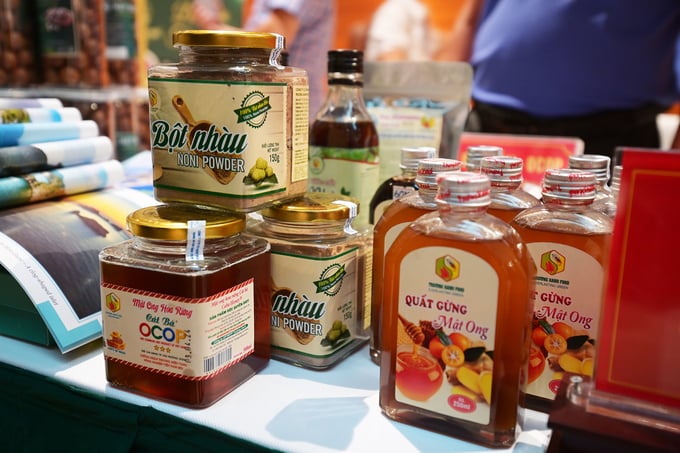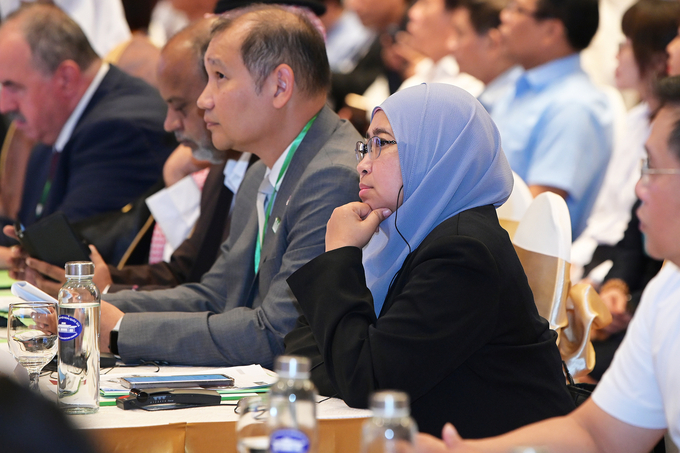November 26, 2025 | 22:02 GMT +7
November 26, 2025 | 22:02 GMT +7
Hotline: 0913.378.918
November 26, 2025 | 22:02 GMT +7
Hotline: 0913.378.918

Vietnam has many products suited to the Halal market, but knowledge about this market remains limited. Photo: Tung Dinh.
Halal certification is not solely an economic activity, but rather a service that is dedicated to the Muslim community and broader social welfare, as Mr. Zafer Gedikli, President of the World Halal Council (WHC), clarified.
"Halal extends beyond food and beverages; it encompasses pharmaceuticals, healthcare equipment, fashion, tourism, communications, and logistics," Gedikli pointed out.
With approximately 2 billion Muslims worldwide, the rapid growth in the Muslim population is expected to positively influence the Halal economy. Key sectors include the Halal food and beverage industry, cosmetics, pharmaceuticals, Islamic financial services, Islamic fashion, Halal tourism, and Islamic media.
Although Vietnam has a small Muslim population, Mr. Gedikli observed that the country has immense potential and significant opportunities in the Halal industry. Its geographical location, which neighbors Muslim-majority nations like Indonesia and Malaysia, offers significant advantages for the expansion of the Halal market.
"I visited Vietnam and believe that it can become an appealing destination for Muslim tourists if awareness around Halal increases and if infrastructure and facilities catering to Muslims, such as appropriate accommodations and dining options, are developed," said the WHC Executive Director.
To increase awareness within the Halal industry, Mr. Gedikli recommended that businesses prioritize staff training and the development of robust consumer relationships.
"The biggest barrier currently facing the expansion of Vietnam's Halal market is a lack of understanding of Halal requirements and market conditions among entrepreneurs and small businesses," according to the WHC executive.
Many producers, especially small and medium enterprises, are still unfamiliar with the various aspects of Halal compliance, from sourcing ingredients to processing and packaging. This lack of knowledge hinders businesses from meeting the stringent standards necessary to obtain Halal certification.
For instance, in Vietnam, it is common to add a few droplets of alcohol to condiments while dining at a restaurant; however, Muslims are prohibited from doing so.
Muslims consume cattle, poultry, and lamb; however, they are prohibited from consuming these animals unless they are slaughtered following Islamic rituals.
Mr. Zafer Gedikli introduced WHC as a global organization that encompasses Halal certification bodies worldwide. WHC, which was founded in 1999, has been committed to serving as the representative of Halal certification organizations.
WHC formulated the first Halal standard that is now recognized by Halal Certification Bodies (HCBs) internationally. This standard serves as a model for numerous other certification agencies.

Conferences and seminars on the Halal market held in Vietnam have garnered significant interest from both suppliers and consumers. Photo: Tung Dinh.
"WHC has members from a variety of countries, and it is fascinating that the majority of these members are from countries with a low Muslim population, including the United States, Germany, Greece, Bulgaria, Russia, China, Canada, Malawi, and Sweden," the WHC President continued.
Consequently, WHC possesses a profound comprehension of the circumstances in countries with a minority Muslim population, such as Vietnam, and can serve as a conduit between Muslim consumers, Halal certification bodies, and entrepreneurs within the country.
Nevertheless, Mr. Zafer Gedikli also acknowledged that the success of the Halal market expansion in Vietnam is contingent upon the efforts of government agencies, industry associations, and businesses.
"By investing in raising awareness about Halal, simplifying the certification process, and actively promoting Vietnam's Halal products in the international market, Vietnam can overcome challenges and tap into the vast potential of the global Halal economy," he indicated.
In order to facilitate this, WHC could collaborate with Halal certification agencies in Vietnam to standardize the Halal certification procedure. Collaboration with Vietnam provides WHC with numerous benefits, including the provision of auditor training, assistance in the establishment of Halal certification bodies, and the exchange of knowledge and information.
Another advantage is that WHC has personnel who specialize in collaborating with international companies and operate in numerous countries. WHC has the ability to establish connections with government agencies in a Muslim-majority country and furnish all the requisite information for conducting Halal business in that country.
"We are prepared to share our Halal expertise with our Vietnamese peers", the WHC President also expressed his enthusiasm for the organization of a special meeting in Vietnam to further discuss potential collaborations, meet with businesses, industry associations, and Halal certification agencies, and share insights from our experts at WHC.
Values and certain Islamic principles
Muslims are required to engage in sacred religious practices, including prayer, fasting, charity (zakat), pilgrimage, striving for justice (jihad), and demonstrating kindness to their parents, relatives, and neighbors, according to Mr. Zafer Gedikli. The most critical aspect is to execute these responsibilities with an entirely pure intention, in a state of harmony between the body and the soul.
Acts such as drinking alcohol, gambling, charging interest on loans, eating pork, or committing adultery are all forbidden by Allah. A Muslim must eliminate these behaviors from their life and take care not to approach them. For instance, they must check the ingredients of food they plan to consume to ensure it meets Halal standards.
Furthermore, Islam prohibits the following: arrogance, greed, selfishness, envy, hostility, gossip, lying, cruelty, and mercilessness.
Translated by Linh Linh

(VAN) China’s cooking oil is suddenly flooding into India. It all comes down to a soybean surplus that Beijing doesn’t quite know what to do with.

(VAN) An Giang promotes supply-demand connections, standardizes quality and builds value chains, creating a foundation for sustainable bird’s nest development and aiming to expand exports.
/2025/11/24/5339-4-nongnghiep-075331.jpg)
(VAN) Recently, the conference on 'Sustainable Fisheries Linkage Chain - Tilapia for Export' took place in Tien Hai commune, Hung Yen province.
/2025/11/21/4309-2-153400_128.jpg)
(VAN) Green and low-emission rice is paving the way for Vietnamese rice to enter high-end markets, marking the beginning of a transformation journey toward greening and elevating the national rice brand.

(VAN) ‘Right to Win’ outlines a national action plan that shapes a new vision for Viet Nam’s agriculture in an era of renewal and global integration.

(VAN) Lam Dong’s farmed sturgeon output this year is expected to reach 2,300 tons, worth VND 450 billion, affirming the brand’s position on the market.

(VAN) A surge in Ukrainian egg exports, largely driven by soaring sales to the UK over the last few years, has notably pushed up egg prices on the domestic market.